2019
Prosecuting Mass Destruction
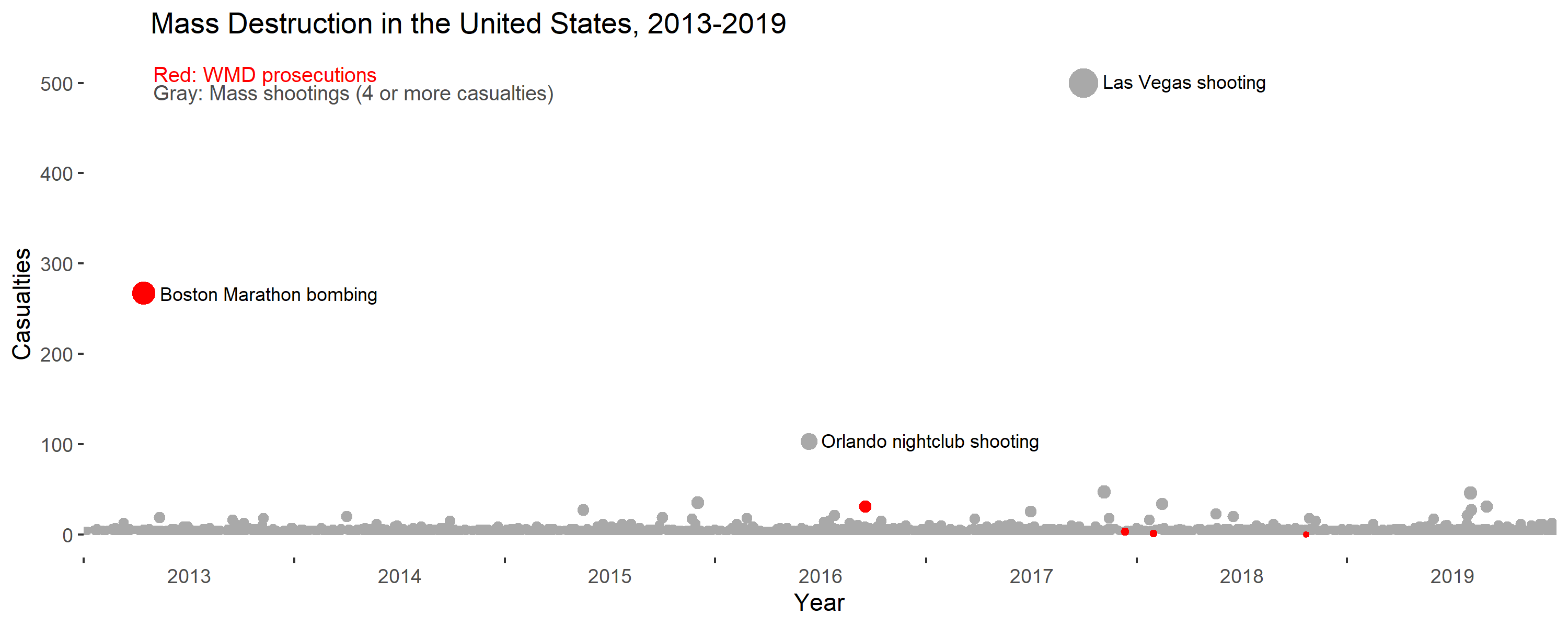 Charles Kurzman, “Prosecuting Mass Destruction,” December 30, 2019. In early 2018, a small bomb exploded in Anderson County, South Carolina, injuring a man’s leg. The Department of Justice prosecuted the case as illegal use of weapons of mass destruction. So why aren’t high-powered firearms classified as weapons of mass destruction too? More…
Charles Kurzman, “Prosecuting Mass Destruction,” December 30, 2019. In early 2018, a small bomb exploded in Anderson County, South Carolina, injuring a man’s leg. The Department of Justice prosecuted the case as illegal use of weapons of mass destruction. So why aren’t high-powered firearms classified as weapons of mass destruction too? More…
Big Data and Mega Corpora in Middle East Studies
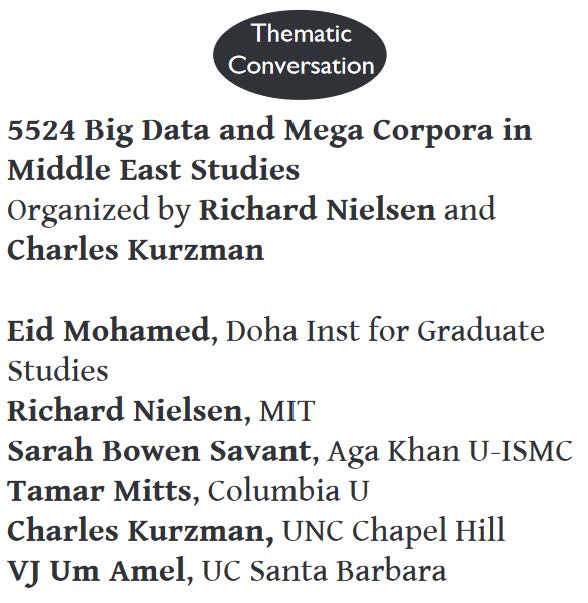 Charles Kurzman, “Big Data and Mega Corpora in Middle East Studies,” November 25, 2019. The humanities and social sciences don’t necessarily cross paths in the field of Middle East studies. At conferences, they attend separate panels and huddle in separate clusters for informal conversation. Increasingly, though, a subset of scholars across the humanities and social sciences is using the same set of research tools: text-analysis software that falls under the rubric of both “digital humanities” and “computational social science.” A “thematic conversation” at the recent annual conference of the Middle East Studies Association – “Big Data and Mega Corpora in Middle East Studies” – brought these two sets of scholars into conversation, many for the first time. More…
Charles Kurzman, “Big Data and Mega Corpora in Middle East Studies,” November 25, 2019. The humanities and social sciences don’t necessarily cross paths in the field of Middle East studies. At conferences, they attend separate panels and huddle in separate clusters for informal conversation. Increasingly, though, a subset of scholars across the humanities and social sciences is using the same set of research tools: text-analysis software that falls under the rubric of both “digital humanities” and “computational social science.” A “thematic conversation” at the recent annual conference of the Middle East Studies Association – “Big Data and Mega Corpora in Middle East Studies” – brought these two sets of scholars into conversation, many for the first time. More…
What Terror Experts Can Learn From Public Health Experts
 Charles Kurzman, “What Terror Experts Can Learn From Public Health Experts,” Foreign Policy, September 28, 2019. “In the early 2000s, two events sowed fear in the United States and around the world: the 9/11 attacks in 2001 and the SARS outbreak of 2002 and 2003. In the years that followed, the professional communities responsible for responding to these threats, and informing the public about them, have followed two very different paths. In the fight against deadly diseases, public health experts have sought to balance the need for preparedness with their duty to avoid hyperbole, which can lead to panic. National security experts should adopt this same ethos. More…
Charles Kurzman, “What Terror Experts Can Learn From Public Health Experts,” Foreign Policy, September 28, 2019. “In the early 2000s, two events sowed fear in the United States and around the world: the 9/11 attacks in 2001 and the SARS outbreak of 2002 and 2003. In the years that followed, the professional communities responsible for responding to these threats, and informing the public about them, have followed two very different paths. In the fight against deadly diseases, public health experts have sought to balance the need for preparedness with their duty to avoid hyperbole, which can lead to panic. National security experts should adopt this same ethos. More…
Women’s Assessments of Gender Equality
 Charles Kurzman, Willa Dong, Brandon Gorman, Karam Hwang, Renee Ryberg, and Batool Zaidi, “Women’s Assessments of Gender Equality,” Socius, Vol. 5, September 4, 2019. “Women’s assessments of gender equality do not consistently match global indices of gender inequality. In surveys covering 150 countries, women in societies rated gender-unequal according to global metrics such as education, health, labor-force participation, and political representation did not consistently assess their lives as less in their control or less satisfying than men did. Women in these societies were as likely as women in index-equal societies to say they had equal rights with men. Their attitudes toward gender issues did not reflect the same latent construct as in index-equal societies, although attitudes may have begun to converge in recent years. These findings reflect a longstanding tension between universal criteria of gender equality and an emphasis on subjective understandings of women’s priorities.” Full paper and supplementary material (open access). Country-level replication data.
Charles Kurzman, Willa Dong, Brandon Gorman, Karam Hwang, Renee Ryberg, and Batool Zaidi, “Women’s Assessments of Gender Equality,” Socius, Vol. 5, September 4, 2019. “Women’s assessments of gender equality do not consistently match global indices of gender inequality. In surveys covering 150 countries, women in societies rated gender-unequal according to global metrics such as education, health, labor-force participation, and political representation did not consistently assess their lives as less in their control or less satisfying than men did. Women in these societies were as likely as women in index-equal societies to say they had equal rights with men. Their attitudes toward gender issues did not reflect the same latent construct as in index-equal societies, although attitudes may have begun to converge in recent years. These findings reflect a longstanding tension between universal criteria of gender equality and an emphasis on subjective understandings of women’s priorities.” Full paper and supplementary material (open access). Country-level replication data.
Sociologies of Islam
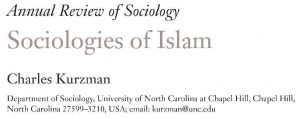 Charles Kurzman, “Sociologies of Islam,” Annual Review of Sociology, August 2019, Vol. 45, pp. 265-277. “The sociology of Islam arguably emerged in the fourteenth century with the work of Ibn Khaldun, but the term itself appeared first in 1931. In recent years, the field has expanded to encompass the study of all aspects of the social lives of the world’s Muslims, who constitute one-fifth of the global population — hence the plural label, sociologies of Islam. This article reviews four central debates in the field: approaches to Muslim modernities, challenging Orientalist images of Islam as enduringly premodern; tensions between national and global Islamic identities and institutions; activism around Muslim women’s rights, both by women and by state-building men; and proliferating challenges to Muslim authorities. As the field confronts political pressures and barriers to scholarly travel, the way forward may involve collaborations that extend training opportunities and comparative research across national and regional borders.” More…
Charles Kurzman, “Sociologies of Islam,” Annual Review of Sociology, August 2019, Vol. 45, pp. 265-277. “The sociology of Islam arguably emerged in the fourteenth century with the work of Ibn Khaldun, but the term itself appeared first in 1931. In recent years, the field has expanded to encompass the study of all aspects of the social lives of the world’s Muslims, who constitute one-fifth of the global population — hence the plural label, sociologies of Islam. This article reviews four central debates in the field: approaches to Muslim modernities, challenging Orientalist images of Islam as enduringly premodern; tensions between national and global Islamic identities and institutions; activism around Muslim women’s rights, both by women and by state-building men; and proliferating challenges to Muslim authorities. As the field confronts political pressures and barriers to scholarly travel, the way forward may involve collaborations that extend training opportunities and comparative research across national and regional borders.” More…
The Disparaging Implications of Strategic Location
 Charles Kurzman, “The Disparaging Implications of Strategic Location,” July 31, 2019. We can probably all agree that the Strait of Hormuz is strategically located — one sixth of the world’s oil production and one third of the world’s natural gas pass through its narrow shipping lanes. But what about Afghanistan (“strategically located on the map”), Algeria (“strategically situated on the rim of the Mediterranean Sea, gateway to the deep Sahara”), Andorra (“strategic location in between Spain and France”), Angola (“strategic location in southern Africa”), and Azerbaijan (“strategically located near Afghanistan, Iran and Iraq”)? More…
Charles Kurzman, “The Disparaging Implications of Strategic Location,” July 31, 2019. We can probably all agree that the Strait of Hormuz is strategically located — one sixth of the world’s oil production and one third of the world’s natural gas pass through its narrow shipping lanes. But what about Afghanistan (“strategically located on the map”), Algeria (“strategically situated on the rim of the Mediterranean Sea, gateway to the deep Sahara”), Andorra (“strategic location in between Spain and France”), Angola (“strategic location in southern Africa”), and Azerbaijan (“strategically located near Afghanistan, Iran and Iraq”)? More…
Acknowledging State Terrorism
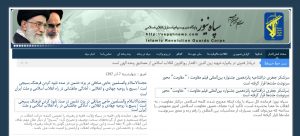 Charles Kurzman, “Acknowledging State Terrorism,” June 20, 2019. The United States government now recognizes the existence of state terrorism. If the Iranian Revolutionary Guard Corps (IRGC) is a foreign terrorist organization, as the Trump administration announced in April, then what other government agencies around the world meet the Department of State’s statutory definition of terrorism: “premeditated, politically motivated violence perpetrated against noncombatant targets”? More…
Charles Kurzman, “Acknowledging State Terrorism,” June 20, 2019. The United States government now recognizes the existence of state terrorism. If the Iranian Revolutionary Guard Corps (IRGC) is a foreign terrorist organization, as the Trump administration announced in April, then what other government agencies around the world meet the Department of State’s statutory definition of terrorism: “premeditated, politically motivated violence perpetrated against noncombatant targets”? More…
The Privacy Rights of Terrorism Defendants, Muslim and Non-Muslim
 Charles Kurzman, “The Privacy Rights of Terrorism Defendants, Muslim and Non-Muslim,” Lawfare, April 5, 2019. The official position of the Department of Justice—according to a legal brief filed in February—is that association with a terrorism charge is so stigmatizing that defendants should not be publicly identified. This is puzzling, since the department itself periodically releases a list of Muslim Americans convicted in terrorism-related cases, as well as hundreds of press releases naming Muslim American terrorism defendants. Yet the department has never released a list of domestic terrorism-related cases, and its press releases named only one-quarter of defendants involved in right-wing violent extremism. More…
Charles Kurzman, “The Privacy Rights of Terrorism Defendants, Muslim and Non-Muslim,” Lawfare, April 5, 2019. The official position of the Department of Justice—according to a legal brief filed in February—is that association with a terrorism charge is so stigmatizing that defendants should not be publicly identified. This is puzzling, since the department itself periodically releases a list of Muslim Americans convicted in terrorism-related cases, as well as hundreds of press releases naming Muslim American terrorism defendants. Yet the department has never released a list of domestic terrorism-related cases, and its press releases named only one-quarter of defendants involved in right-wing violent extremism. More…
Building Bridges Podcast
 Interview about The Missing Martyrs on the Building Bridges Podcast, Georgetown University, March 1, 2019. More…
Interview about The Missing Martyrs on the Building Bridges Podcast, Georgetown University, March 1, 2019. More…
The Destruction of Syria
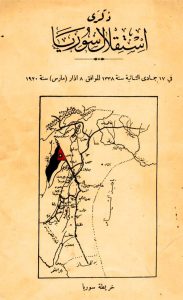
Fictitious national assembly in “Lawrence of Arabia,” directed by David Lean, 1962 (IMDB entry).
Syrian national assembly and declaration of independence, 1918-1920 (Hathi Trust).
Ottoman provinces of the eastern Mediterranean (Levant, al-Sham, Greater Syria) (1893 map).
Ethno-sectarian groups (Gulf/2000, Columbia University).
Sykes-Picot Agreement, 1916 (Wikipedia).
French conquest of Syria, 1920 (map of French mandate). More…
Muslim-American Involvement with Violent Extremism, 2001-2018
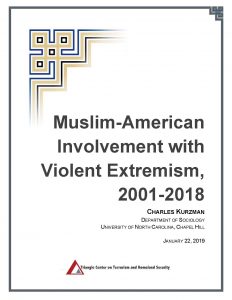 Charles Kurzman, “Muslim-American Involvement with Violent Extremism, 2001-2018,” Triangle Center on Terrorism and Homeland Security, January 22, 2019. The wave of Muslim-Americans associating themselves with the self-proclaimed “Islamic State” appears to have dwindled, continuing a downward trend that was visible in the final year of the Obama administration. There were no incidents or arrests in 2018 involving Muslim extremists who entered the United States illegally. These findings contradict the alarms about terrorism sounded by the Trump administration. In a survey conducted for this report, terrorism experts attribute the decline in Muslim-American involvement with violent extremism to the loss of territory by the Islamic State, the reduction in online recruitment, and the already small scale of Muslim-American extremism. More…
Charles Kurzman, “Muslim-American Involvement with Violent Extremism, 2001-2018,” Triangle Center on Terrorism and Homeland Security, January 22, 2019. The wave of Muslim-Americans associating themselves with the self-proclaimed “Islamic State” appears to have dwindled, continuing a downward trend that was visible in the final year of the Obama administration. There were no incidents or arrests in 2018 involving Muslim extremists who entered the United States illegally. These findings contradict the alarms about terrorism sounded by the Trump administration. In a survey conducted for this report, terrorism experts attribute the decline in Muslim-American involvement with violent extremism to the loss of territory by the Islamic State, the reduction in online recruitment, and the already small scale of Muslim-American extremism. More…
The Missing Martyrs: Why Are There So Few Muslim Terrorists? (updated for the age of ISIS)
Charles Kurzman, The Missing Martyrs: Why Are There So Few Muslim Terrorists? (New York: Oxford University Press, 2019). Released December 7, 2018. More…